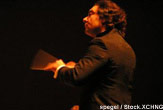Orchestra Conducters are Better Listeners

Get the world’s most fascinating discoveries delivered straight to your inbox.
You are now subscribed
Your newsletter sign-up was successful
Want to add more newsletters?
Join the club
Get full access to premium articles, exclusive features and a growing list of member rewards.
In a recent study, two groups of people were seated in a dark room. They were presented with brief flashes of light and short beeps coming from random directions.
Each test subject used a laser pointer to identify the locations of the lights and sounds.
Both groups did equally well pinpointing the flashes of light. But one group did much better locating the sounds. All of the 20 members in this more successful group were musical conductors with at least 10 years experience leading a school band or orchestra.
The conductors also did much better when the light and sound were combined than they did on tasks using visual targets alone. The musically untrained group did not show this improvement.
"Our research suggests that conductors are better able to combine and use auditory and visual cues than the musically untrained," says Donald Hodges, a professor of music education at the University of North Carolina at Greensboro. "The conductors were also significantly better at locating sounds in space and using sound to locate objects."
The results were presented today at the 35th annual meeting of the Society for Neuroscience in Washington, D.C.
The research builds on previous work that has shown musical training expands the mind in more ways than one. A study in 2001 found that professional musicians trained at an early age have more gray matter in certain parts of their brains than non-musicians. In 2003, researchers learned that children with music training had significantly better verbal memory than other kids.
Get the world’s most fascinating discoveries delivered straight to your inbox.
Hodges and his colleagues plan to do another round of tests while imaging the subjects' brains.
"We hope to learn which brain areas are involved in this ability and how they can be enhanced by training," said Jonathan Burdette, associate professor of radiology at Wake Forest University Baptist Medical Center.
 Live Science Plus
Live Science Plus











